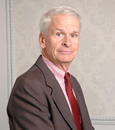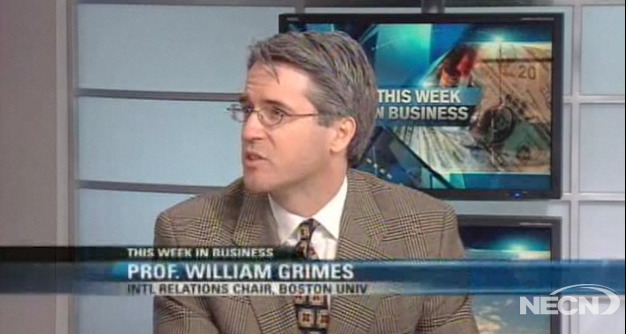March 25, 2011 at 12:03 pm
Boston University international relations professor Michael Corgan is a specialist in international security. A U.S. Naval Academy graduate and former teacher there, he also has extensive government service in political and military planning, especially NATO. Professor Corgan offers the following comment on the announcement that NATO will take command of the no-fly zone in Libya.
“It seems to me that the demurrals about the mission from NATO members Turkey and Lithuania have to do with the fear of mission creep. To wit, how do strikes against Qaddafi’s ground forces serve the UNSC mission of protecting civilian life when the threat to civilians seems to have come mostly from the air?”
Contact Michael Corgan, 617-353-3553, mcorgan@bu.edu
By Jo Breiner
|
Posted in International relations
|
Tagged Libya, Michael Corgan, NATO, no-fly zone
|
March 25, 2011 at 11:10 am

Daniel Miller
A recent study by Boston University School of Social Work Assistant Professor Daniel Miller found that different characteristics of home and school environments were related to a child's body mass index (BMI) in kindergarten and the rate of BMI growth until fifth grade.
Using growth curve modeling and a sample of approximately 11,400 children from the Early Childhood Longitudinal Study kindergarten cohort, the study investigates the role school and home environments play in the childhood obesity epidemic.
Miller’s research concluded that after controlling for a large number of socio-demographic variables, children’s overall activity levels, characteristics of schools, and the influence of early health, a number of different home and school factors were found to be significantly associated with a child's BMI in kindergarten and the rate of change in BMI over time.
Read More »
By Kira Jastive
|
Posted in Health, Public Health
|
Tagged BMI, body mass index, Boston University School of Social Work, childhood obesity, Daniel Miller, Social Science & Medicine
|
March 25, 2011 at 10:35 am
 Boston University international relations professor Charles Dunbar was a State Department foreign service officer from 1962-1993. He served as U.S. ambassador to Yemen from 1988-1991. Professor Dunbar is available to offer insight and analysis into the protests which are continuing to intensify in Yemen.
Boston University international relations professor Charles Dunbar was a State Department foreign service officer from 1962-1993. He served as U.S. ambassador to Yemen from 1988-1991. Professor Dunbar is available to offer insight and analysis into the protests which are continuing to intensify in Yemen.
Contact 617-353-5633, cfdunbar@bu.edu
By Jo Breiner
|
Posted in International relations
|
Tagged Charles Dunbar, International relations, protests, Yemen
|
March 24, 2011 at 8:57 am
Boston University international relations professor William Keylor, author of "A World of Nations: The International Order Since 1945," offers the following historical perspective on the allied efforts in Libya:
"The Hobson's choice Obama faces seems to be a simple one. Either run the operation unilaterally, and incur the resentment of Arab countries and the strong disapproval of many NATO allies, or try to preserve the broad coalition he has assembled which includes several Arab nations, in the face of divergent objectives pursued by its member states.
"Coalition warfare is always exceedingly difficult to manage, as Roosevelt, Churchill, and Stalin learned in World War II. But the alternative is a reversion to a U.S.-dominated unilateral operation as occurred in response to the humanitarian crisis in Somalia, Bosnia, and Kosovo in the 1990s. The decision he makes is bound to have many unforseen consequences for the region."
Contact William Keylor, 617-358-0197, wrkeylor@bu.edu
By Jo Breiner
|
Posted in International relations
|
Tagged allied forces, International relations, Libya, William Keylor
|
March 22, 2011 at 8:45 am
 Joan Salge Blake, Clinical Associate Professor of Nutrition at College of Health and Rehabilitation Sciences: Sargent College, reacts to today's announcement of the dismissal of the Boston Public School's longtime director of food and nutrition services. The dismissal was sparked by Boston Councilor at Large John R. Connolly's surprise investigative visits to BPS cafeterias earlier this year and the reported 280 cases of out-of-date food in 40 BPS cafeterias:
Joan Salge Blake, Clinical Associate Professor of Nutrition at College of Health and Rehabilitation Sciences: Sargent College, reacts to today's announcement of the dismissal of the Boston Public School's longtime director of food and nutrition services. The dismissal was sparked by Boston Councilor at Large John R. Connolly's surprise investigative visits to BPS cafeterias earlier this year and the reported 280 cases of out-of-date food in 40 BPS cafeterias:
Read More »
By Lauren Davalla
|
Posted in Health
|
Tagged Boston Public Schools, chicken breast, College of Health and Rehabilitation Sciences: Sargent College, food dating, fruit, Joan Salge Blake, John Connolly, nutrition, vegetables
|
March 21, 2011 at 10:52 am
The following Boston University professors are available to offer commentary, analysis, and insight into the current situation in Libya, also known as Operation Odyssey Dawn.
Augustus Richard Norton, International relations professor; Middle East specialist and a member of the Baker-Hamilton Iraq Study Group; Author of "Hezbollah: A Short History"
Contact 617-358-7808, arn@bu.edu, Twitter @arnorton
Charles Dunbar, International relations professor; Former U.S. ambassador to Yemen
Contact 617-353-5633, cfdunbar@bu.edu
Joseph Wippl, International relations professor; a 30-year CIA veteran
Contact 617-353-8992, jwippl@bu.edu
Michael Corgan, International relations professor; a specialist in international security with extensive government service in political and military planning (especially NATO)
Contact 617-353-3553, mcorgan@bu.edu
William Keylor, International relations professor; Author of "A World of Nations: The International Order Since 1945"
Contact 617-358-0197, wrkeylor@bu.edu
Robert Zelnick, Journalism professor; Former ABC News foreign correspondent; Regular contributor to PoliticoArena
Contact 617-353-5007, bzelnick@bu.edu
By Jo Breiner
|
Posted in International relations
|
Tagged air strike, Augustus Richard Norton, Charles Dunbar, Joseph Wippl, Libya, Operation Odyssey Dawn, Robert Zelnick
|
March 21, 2011 at 7:32 am
 William Grimes, chairman of the International Relations Department at Boston University, appeared on NECN's "This Week in Business" offering his perspective on the economic situation and impact of the Japanese earthquake.
William Grimes, chairman of the International Relations Department at Boston University, appeared on NECN's "This Week in Business" offering his perspective on the economic situation and impact of the Japanese earthquake.
"The big parts of the disruption have to do with supply chain issues and electrical power generation, in terms of the country as a whole."
Watch full interview here.
Contact William Grimes, 617-353-9420, wgrimes@bu.edu
By Jo Breiner
|
Posted in Economics, International relations
|
Tagged Earthquake, Economic impact, International relations, Japan, NECN, William Grimes
|
March 15, 2011 at 1:07 pm
Boston University international relations professor Michael Corgan, a specialist in international security with extensive government service in political and military planning (especially NATO), offers his view on the U.S. future in Afghanistan. His comments come as General David Petraeous testifies before the Senate Armed Services Committee.
"They're right and we're wrong. We've done about all we could for Karzai and his cronies and its time to cut losses (as we should have done in Vietnam).
"What we've mostly shown in the ten years of our efforts and sacrifices, which on the whole have been pretty good, is that Afghanistan is a place on the map and not a coherent country. If it's ever to be run as most in the west think a country should be run, the Afghan people collectively are going to have to decide to abandon tribalism and traditionalism and do it themselves.
"We should do what DeGaulle did in Algeria: declare ourselves the winner and go home.”
Contact Michael Corgan, 617-353-3553, mcorgan@bu.edu
By Jo Breiner
|
Posted in International relations
|
Tagged Afghanistan, General David Petraeous, Michael Corgan
|

 Boston University
Boston University 
 William Grimes
William Grimes